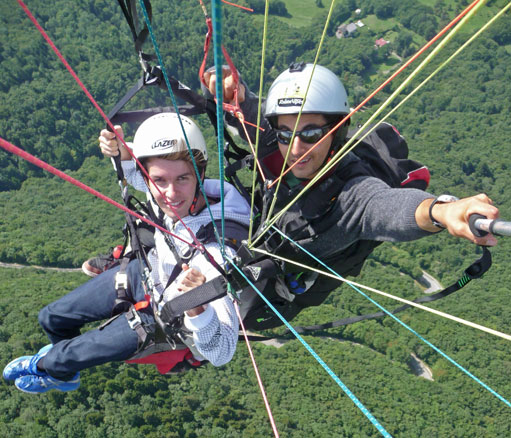
ATLAS e-News
23 February 2011
7 September 2010
Elvar Karl Bjarkason
Nationality: Icelandic

Elvar paragliding with a friend
“I've always been interested in science, and questions about the universe and what makes it tick.” says Elvar Bjarkason. Like many physicists he began by being interested in general science, so still in primary school he liked mathematics, chemistry and physics, while learning about the structure of atoms. But that was just a start.
Later, in his last three semesters at high school, he was much encouraged by three young and very enthusiastic teachers, teaching physics, astronomy/astrophysics and philosophy. “I liked the thought aspect in philosophy, as mentioned by Thomas Kuhn in the “The Structure of Scientific Revolutions” and in “The Scientific method” by Sir Karl Raimund Popper;” recalls Elvar. “I could very easily relate to them (my teachers) and they were in many ways a big factor in thinking I could have a future in physics,” he continues.
As he had good marks in all subjects, choosing which subject to study was still difficult. His Icelandic teacher suggested that he should study Icelandic literature. With both parents being geologists, geology would have been another option. Iceland's knowledge in geothermal energy is in high demand today and Elvar's father, working in geothermal exploration, travels to Indonesia, Turkey and New Mexico.
Travelling as part of a career was a tempting prospect to Elvar as well, and so he wondered if perhaps geophysics was in his future.
Finally he made up his mind and started to study physics at the University of Iceland in Reykjavik, where he has finished his second year of undergraduate study. “I found out about the summer student program when I saw it advertised by the student council for physics and math at my University.” Actually, he found out about it last year, but when he was in the process of applying for it, his professor suggested that he should wait another year and learn about quantum mechanics first, to really take benefit. Luckily he did, not just to follow the seminars at the CERN summer schools more easily, but also as this year the LHC is running and CERN is even more the place to be as a physicist...
Since Iceland is not a CERN member state, his summer-studentship is just 8 weeks long, with 6 weeks of lectures. “I do learn a lot, as most information is new to me. Most summer students have already finished their third year of undergraduate or have started their masters. Some seminars are too basic for me, but some are too advanced,” he explains and continues, “Next year I'm [going to take] more quantum mechanics, not just math.”
But he is not just learning a lot in the lectures. For his project, the offline display for histograms of ATLAS, he has to use ROOT, Python XML/HTML and Java. He learned these programming languages by using them. “I had a course in Matlab at the university and knowing one programming languages, it is easy to learn another one. I like the challenge of programming,” Elvar explains.
Unfortunately programming means a lot of desktop work - something that Elvar is not so fond of. “I like sports a lot - actually any sport with a racquet, like squash and tennis, Basketball and my favourite is floorball.” The game of floorball is also known by many other names, such as salibandy (in Finland), innebandy (in Sweden and Norway), and unihockey (in Switzerland and Germany). The game is believed to have originated in Gothenburg, Sweden, where it was played for fun as a pastime at schools. Floorball is played indoors with players, except for the goalkeeper, using a floorball stick that is short, (as compared with ice hockey), to get a plastic whiffle ball into a net past a goalkeeper “It is still a small sport in Iceland compared to Finland, Sweden or Norway” Elvar mentions and adds proudly, “The team I am playing on as winger is right now national champion and cup champion as well.”
Elvar's plans for the future are to finish his undergraduate studies in Iceland and then change to a Scandinavian university - maybe to Copenhagen, as he already knows Danish. It is still undecided, if it would be Astrophysics, Particle physics or Geophysics. Although the experience as summer student at CERN was meant to help him with his choice, he is still not totally sure. What he is definitely taking back home from Geneva and CERN is the experience of working in a big place dedicated to physics. “But for CERN being the high-end place of physics worldwide the environment and the building are rather odd,” he smiles. “Most of us summer students did expect a much more modern architecture. But obviously all the money goes into the experiment,” he adds with a grin and continues, “I appreciated a lot meeting other students from all over the world and discuss[ing] with them their plans for their further studies.” And he concludes: “I hope to keep in contact and have the opportunity to work together with some of them in the future.” And maybe come back to CERN as a fellow, once he finishes his studies…

Birgit EwertATLAS e-News
|